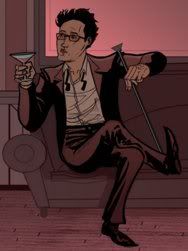 Editor's Note: Tony Chavira writes the noir-inspired, pun-loving, slapstick and always-entertaining online comic Tuna Carpaccio P.I. (which, he reminds me, is illustrated by the awesome Josh Dunlap). If you aren't acquainted with Tuna's baddie beating ways, why not start at the beginning? Tony is also the associate editor of the advocacy Web site Four Story and a contributor to Freshome: Interior Design & Architecture. I asked him about the challenges of working in genres, particularly when combining those that are wildly divergent.
Editor's Note: Tony Chavira writes the noir-inspired, pun-loving, slapstick and always-entertaining online comic Tuna Carpaccio P.I. (which, he reminds me, is illustrated by the awesome Josh Dunlap). If you aren't acquainted with Tuna's baddie beating ways, why not start at the beginning? Tony is also the associate editor of the advocacy Web site Four Story and a contributor to Freshome: Interior Design & Architecture. I asked him about the challenges of working in genres, particularly when combining those that are wildly divergent.I feel that the terms "genre" and "category" are unfortunately synonymous to writers grappling with the existential state of original story development. And that's totally understandable: As soon as you're asked to explain your story to genuinely interested friends, summaries automatically begin by pigeonholing your awesome concept into an archetypical genre. When I spoke to Loren about our online comic Tuna Carpaccio P.I., I felt compelled to begin with "it's a noir comedy" and intrinsically labeled myself a genre writer: a slave to the genres' expectations: "farce," "fiction," "melodrama," whatever. Tuna Carpaccio P.I. had no choice: It not only had to be dark, gritty and full of crooked dealings, it also had to catch you off guard, involve jokes and (you know) make you laugh at some point. And these were only the essential expectations of writing in these genres! Ultimately, developing any story on top of that, original or otherwise, requires a ridiculous amount of research, frustration and self-evaluation. What's worse, the well-researched can find genre writing especially frustrating when suddenly they begin to notice similarities between their story and a classic within the genre. Trust me, there's nothing worse than writing something you think is original and finding out that's basically a satire of Double Indemnity, plot point for plot point.
I didn't originally intend to write in the outline of any genre, although writing a comic tends to be more exaggerated (and arguably is a genre of its own). Originally Tuna Carpaccio P.I. was a detective story about an overconfident action hero who felt that he would make a great detective set in a Looney Tunes-inspired universe, and you may or may not notice that the humor and violence reflect this description pretty directly. In particular, I was most inspired by a Warner Brothers cartoon called The Great Piggy Bank Robbery, in which noir detective "Duck Twacy" (aka Daffy Duck) approaches exaggerated knock-off villains reminiscent of those in Chester Gould's Dick Tracy. Building on this, Tuna Carpaccio P.I. would run wild in a city where the villains were developed from puns: "King Pin" would be a king, a bowler, a pin cushion and a mobster; "Chunky Salsa" would be a fat guy, a Latin dancer and speak with references to salsa dip; "Auto Fire" would be part car, part fire and part automatic gun. Somehow I created a villain hierarchy, took hints from classic noir films and books, and -- bam! -- I had a city full of noir subplots for my single-minded hero to stammer through haphazardly.
I don't think I'm fooling anyone though: I absolutely love genre writing. I find it dichotomously frustrating and exhilarating, especially when I can find an excuse to inject another pun-filled villain into the storyline. I know that some people look down on genre writing, but I get the impression that the idea of "genre" isn't what these people dislike. Instead, what bothers these highly-original people is dealing with the inherent irony of writing a story based on anything that can be categorized: The moment you write something new, it can relate to or even becomes a genre.
So if I'm allowed to insert a moral into this guest post, it would be "don't worry about it." At the very least, being frustrated with your story or dialog is more manageable than being frustrated with your whole genre.
(Picture: Copyright 2009 by Josh Dunlap; used by permission)


2 comments:
I think this whole question of genre is a problem both created and continued by the publishing and marketing industries. I understand that it is difficult to market a book without pigeon-holing it a bit, but there are a lot of readers out there that are interested in new and inter-genre ideas.
One of the things I like about China Mieville is that he writes "weird" fiction -- essentially unclassifiable genre fiction. It makes for surprising reading!
Post a Comment